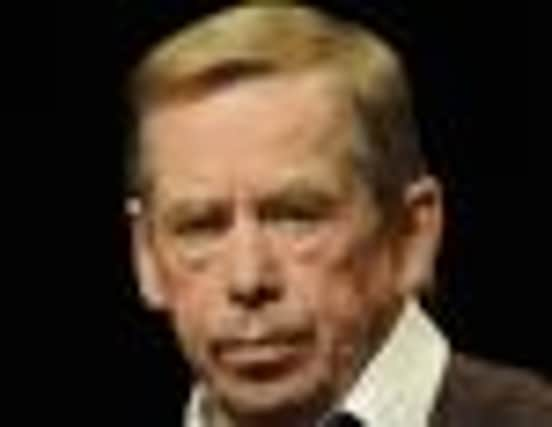Obituary: Václav Havel, Czech playwright and dissident who rose from revolutionary leader to president


Václav Havel, the charismatic and modest dissident playwright who led the Czechoslovakian “Velvet Revolution” was one of the fathers of east European democracy. His calm and resolute behaviour had political consequences far beyond the streets of Prague. The Berlin wall was triumphantly torn down and the Soviet Union ceased to exist. Havel became the first post- communist president of Czechoslovakia and a world figure of much renown. He was a supreme diplomat and an inspiring figure. He remained the shrewd intellectual who kept his feet firmly on the ground and did not get involved in gimmicks and political hype.
Havel’s commitment to non-violent resistance gained worldwide respect and ensured that the 1989 Velvet Revolution, which led to the overthrow of the one-party communist government, was bloodless.
Advertisement
Hide AdAdvertisement
Hide AdThat calm diplomatic approach also ensured that the “velvet divorce” three years later, when Czechoslovakia was split into the Czech Republic and Slovakia, was equally peaceful. Havel opposed the split and resigned from the presidency in 1992, but his composed authority was one of the historic hallmarks of the era. Nothing typified Václav Havel more than the words he chose as his motto: “Truth and love must prevail over lies and hate.”
Václav Havel was the son of a well-to-do engineer who had property sequestered when the communists took power in 1948. His father was imprisoned and Havel left school at 15 to find work and do national service.
But Havel had developed a keen interest in the theatre and gained a reputation for writing satirical plays. This was in addition to his work as a lab assistant, but after the traumas of the Warsaw Pact invasion of Czechoslovakia in August 1968 and the removal by the Soviets of the enlightened Alexander Dubcek regime, Havel became an ardent activist. He was a founder member of Charter 77, an informal civic initiative, and spent much of his forties in and out of prison for “anti-state activities”.
He also worked as a stagehand for the Liberated Theatre – an enlightened group that produced many new writers and controversial plays. Havel’s first play, The Memorandum (1965), was a savage satire against the widespread bureaucracy of the authorities.
Havel learnt to be careful. The Soviet invasion ended open criticism and his plays were banned. He continued to produce a series of one-act plays, which were performed in private homes, but his cry for democracy and freedom (he called the regime “Absurdistan”) was still heard in underground theatres.
His plays were steeped in politics – although (perhaps to satisfy the authorities) Havel once said: “I never wanted to be a political writer. I think that good writers and good art, and particularly good theatre, is always political, not because writers and directors want to be political, but because it is something which is in the substance of theatre.”
In 1989, Havel emerged as the leader who commanded respect on the streets of Prague and, finally, in the freezing snow and ice he emerged as the effective voice of Wenceslas Square and was the man the Czechs trusted.
Havel – always a canny politician – had put up posters all round Prague saying “Havel na Hrad!” (Havel to the Castle!). The Czech people, tasting freedom for the first time in half a century sent Havel across the Charles bridge and up to the fairytale Hradcany castle.
Advertisement
Hide AdAdvertisement
Hide AdBut the Prague Spring was short lived. Former colleagues proved unhappy with his economic policies and Havel found himself particularly at odds with the fervent economic views of the emerging, and wealthy, new financiers and the right-wing economists who considered the president a well-meaning but confused idealist.
But Havel maintained a sense of the theatrical. Within months of becoming president, he redesigned the interior of the castle, ordered new livery from a Hollywood designer and had the castle lit by the famous opera designer Joseph Svoboda, who had first come to international attention when Czech Opera visited the Edinburgh Festival in 1964.
Inside Hradcany castle, Havel preserved a practical way to manage affairs: he delighted in dashing from one meeting to the next down the vast corridors on a child’s scooter. Just to add a touch of glamour Havel – a big fan of rock music – made the American musician Frank Zappa an honorary cultural ambassador.
The Slovakian nationalists campaigned strenuously for separation and when their independence was realised, Havel could not hide his disappointment. He was a devoted Czechoslovakian and was deeply wounded to see his opinions ignored by the demonstrators. He ruefully commented “after every party, there’s a hangover” and he resigned the presidency: only to be elected leader, in January 1993, of the new Czech Republic.
Havel was never totally happy marrying capitalism and communism. He was, indeed, an idealist and a social democrat who understood that his beloved Prague had to be opened up to tourists, long-standing Czech businesses had to be privatised and foreign conglomerates allowed in to boost the economy. There were those that felt, however, that Havel hankered after a less abrasive economy.
In 1996, Havel’s first wife Olga Havlova died of cancer and he had a lung removed. He immediately gave up smoking and later married Dagmar Veskrnova, an actress 20 years his junior who survives him. He was a man of immense wit and charm: slight of stature but his personality filled a gathering immediately.
His impish smile, ruffled hair and unkempt moustache became a much-loved trademark throughout Europe.
He was one of the important politicians that masterminded the move of the Czech republic from the edge of Europe to, what he called, “the spiritual crossroads of Europe” and a member of both the European Union and Nato.
He received many international honours, including in 1998 being made an honorary Doctor of Letters by Glasgow University.
ALASDAIR STEVEN